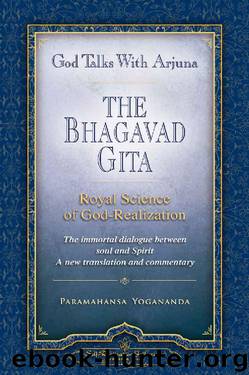God Talks with Arjuna: The Bhagavad Gita by Paramahansa Yogananda

Author:Paramahansa Yogananda [Yogananda, Paramahansa]
Language: eng
Format: epub
Tags: Bhagavad Gita Krishna Arjuna Paramahansa Yogananda Self-realization Yoga Dharma Karma Kriya
Publisher: Self-Realization Fellowship
Published: 2018-12-05T16:00:00+00:00
Verse 24
yo ’ntaḥsukho ’ntarārāmas tathāntarjyotir eva yaḥ
sa yogī brahmanirvāṇaṁ brahmabhūto ’dhigacchati
Only that yogi who possesses the inner Bliss, who rests on the inner Foundation, who is one with the inner Light, becomes one with Spirit (after attaining freedom from karma connected with the physical, astral, and ideational bodies). He attains complete liberation in Spirit (even while living in the body).
To become free forever the devotee must destroy all karma connected with each of his three bodies. Ordinarily, this is accomplished during the slow evolutionary process of countless incarnations (alternations of births and deaths first between the physical and astral worlds, and then between the astral and causal realms). However, one who has attained significant spiritual progress in previous lives and who is adept in Kriya Yoga can hasten his evolution by the inner method and attain liberation while still incarnate in the physical form, as cited in this Gita verse.
It is not enough to persist in fighting the sense impulses and thus strengthen the mind; to become one with Spirit the yogi must enter the deeper states of blissful samadhi, and keep his consciousness ever identified with the soul. Not only must he withdraw his attention from the sensory world, but by becoming immersed in the inner astral and wisdom (causal) light emanating from the soul, he must betake himself through the interpenetrating physical, astral, and ideational bodies into the infinite ocean of Spirit. (See II:20, “Man’s three bodies.”)
So long as a man has any material desires, he has to work out his karma in a physical body. When he is able to extricate himself, by nonattachment and the practice of Kriya Yoga, from all fleshly delusions and bondage, he then finds himself confined in the astral body and entangled in his astral karma. By deeper immersion in ecstasy, the devotee escapes from the astral body and becomes lodged in the causal or ideational body, vibrating with the original subtle seeds of all past karmic impulses. When God thought out the complicated labyrinth of man’s life, He really put His mind to it!
Jesus said that after the destruction of his body, he would rebuild it in three days.15 By this statement he was implying that he would rise above all past impulses (connected with the experiences of the physical, astral, and causal bodies) in three periods (days) of ecstatic upliftment or emergence. A yogi experiences attachment to different effects of past actions as he consciously ascends through his three bodies. Conquering all karma (physical, astral, and ideational), he is indeed free in Spirit.
Download
This site does not store any files on its server. We only index and link to content provided by other sites. Please contact the content providers to delete copyright contents if any and email us, we'll remove relevant links or contents immediately.
| Bhagavad Gita | Upanishads |
| Vedas |
Fingersmith by Sarah Waters(2549)
Kundalini by Gopi Krishna(2185)
Wheels of Life by Anodea Judith(2152)
Indian Mythology by Devdutt Pattanaik(1940)
The Bhagavad Gita by Bibek Debroy(1929)
The Yoga of Jesus: Understanding the Hidden Teachings of the Gospels by Paramahansa Yogananda(1862)
Autobiography of a Yogi (Complete Edition) by Yogananda Paramahansa(1827)
The Man from the Egg by Sudha Murty(1823)
The Book of Secrets: 112 Meditations to Discover the Mystery Within by Osho(1677)
Chakra Mantra Magick by Kadmon Baal(1640)
The Sparsholt Affair by Alan Hollinghurst(1590)
Sparks of Divinity by B. K. S. Iyengar(1537)
Gandhi by Ramachandra Guha(1534)
Avatar of Night by Tal Brooke(1525)
Karma-Yoga and Bhakti-Yoga by Swami Vivekananda(1496)
The Bhagavad Gita (Classics of Indian Spirituality) by Eknath Easwaran(1490)
The Spiritual Teaching of Ramana Maharshi by Ramana Maharshi(1433)
Hindoo Holiday by J. R. Ackerley(1386)
Skanda Purana (Great Epics of India: Puranas Book 13) by Bibek Debroy & Dipavali Debroy(1379)
